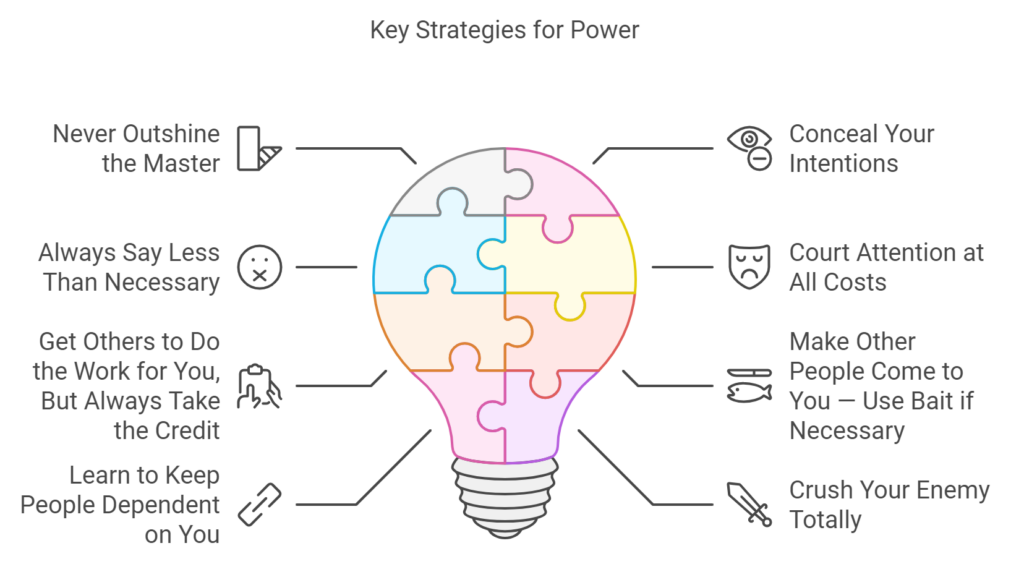11 Key Takeaways from The 48 Laws of Power by Robert Greene
Table of Contents
- Never Outshine the Master
- Conceal Your Intentions
- Always Say Less Than Necessary
- Court Attention at All Costs
- Get Others to Do the Work for You, But Always Take the Credit
- Make Other People Come to You — Use Bait if Necessary
- Learn to Keep People Dependent on You
- Crush Your Enemy Totally
- Use Absence to Increase Respect and Honor
- Create a Cult-Like Following by Playing on People’s Need for Belonging
- Assume Formlessness

1. Never Outshine the Master
Greene advises to always make those above you feel superior. By displaying too much talent or intelligence, you risk inciting feelings of insecurity and envy. It is crucial to allow your superiors to feel comfortable and in control. This helps to maintain a favorable position and avoid potential backlash.
Example:
Galileo, in seeking patronage for his work, carefully praised his benefactors and presented his discoveries as reflections of their greatness, which earned him support without threatening his patrons’ egos.
2. Conceal Your Intentions
To achieve your goals effectively, it is often best to mask your true intentions. By being unpredictable or misdirecting others about your aims, you maintain the element of surprise and keep competitors from undermining your plans. Disguising your motives also helps to manipulate situations more skillfully.
Example:
Cardinal Richelieu, the French statesman, was known for using secrecy and deception to consolidate power and influence the French monarchy’s decisions without revealing his own interests.
3. Always Say Less Than Necessary
Carefully choosing your words and remaining silent when possible enhances your power and influence. When you say less, you appear more profound and mysterious. It prevents you from saying something that could be used against you or diminish your authority.
Example:
During tense diplomatic negotiations, leaders like Napoleon Bonaparte would often speak minimally, allowing others to reveal their plans first or fall into traps, thereby gaining a strategic advantage.
4. Court Attention at All Costs
To rise in power, it is important to be noticed. All attention is beneficial—good or bad. Being ignored or forgotten is worse than being criticized. Cultivate intrigue, stand out, and create an aura that attracts others to you.
Example:
P.T. Barnum, the famed showman, used publicity stunts and outlandish performances to draw public interest to his shows, believing that any attention was better than none.
5. Get Others to Do the Work for You, But Always Take the Credit
Leverage the talents, expertise, and resources of others while ensuring that you receive recognition for the results. By utilizing others’ skills, you save time and energy and expand your influence without revealing the extent of your dependence on them.
Example:
Thomas Edison, known as a great inventor, had a team of assistants working in his labs. While they contributed significantly to his inventions, Edison ensured that he received full credit, enhancing his reputation.
6. Make Other People Come to You — Use Bait if Necessary
By making others come to you, you hold the power in any negotiation or encounter. It allows you to dictate the terms and choose the setting, giving you the upper hand. Using bait to attract others to you allows you to set traps and control the dynamics.
Example:
The Chinese strategist Sun Tzu advocated for this principle, emphasizing that a general should lure the enemy into unfavorable terrain, where they can be easily defeated.
7. Learn to Keep People Dependent on You
If others need you for their success or well-being, you hold control over them. Create a web of dependence so that your power is preserved and strengthened. Make your position indispensable to their future, so they have no choice but to support you.
Example:
Louis XIV of France centralized all power in the monarchy, making his nobles financially and politically dependent on him for status, thereby reducing the risk of rebellion.
8. Crush Your Enemy Totally
Greene emphasizes that half-measures can backfire. If you let an opponent remain, they can seek revenge and undermine you. When dealing with rivals, you should crush them entirely so they are left with no ability to retaliate.
Example:
When Octavian (later Augustus) defeated Mark Antony and Cleopatra, he left no survivors who could contest his claim to power, ensuring that the Roman Empire would remain under his control.
9. Use Absence to Increase Respect and Honor
By strategically withdrawing from social circles or the public eye, you can heighten your value and mystique. Absence can create interest and elevate your status. However, it must be used sparingly; too much absence can lead to being forgotten.
Example:
General Charles de Gaulle of France used absence effectively; stepping back from politics at key moments made his eventual return more celebrated and impactful.
10. Create a Cult-Like Following by Playing on People’s Need for Belonging
To consolidate power, create a devoted following by offering a sense of belonging and shared purpose. Appeal to emotions and offer simple solutions to complex problems to maintain control over your followers. This helps establish loyalty and reduces dissent.
Example:
The cult leader Jim Jones created a sense of family and unity among his followers, which helped him maintain power and loyalty, even leading to the tragic mass suicide in Jonestown.
11. Assume Formlessness
Rigid strategies and fixed plans can make you predictable and vulnerable. To achieve power, remain adaptable and ready to shift your tactics based on the situation. Like water, you should be fluid, shapeless, and able to adjust to any environment or obstacle.
Example:
The martial artist Bruce Lee famously emphasized the principle of “being like water,” able to adapt and take the shape of whatever circumstances present themselves, making one hard to defeat.
If you’re looking to transform your mindset and improve your productivity, there are some powerful books you should explore. Deep Work emphasizes the value of focused work to achieve remarkable results. To unlock financial success, Think and Grow Rich provides proven strategies for wealth and prosperity. Thinking, Fast and Slow offers insights into how we make decisions, exploring both our rapid and slow thinking processes. For strategies on gaining influence, delve into The 48 Laws of Power. To unlock success in all areas of life, The Success Principles provides a roadmap for achievement. Lastly, Mindset explores the power of adopting a growth mindset for personal and professional development. Dive into these books for transformative life changes!

